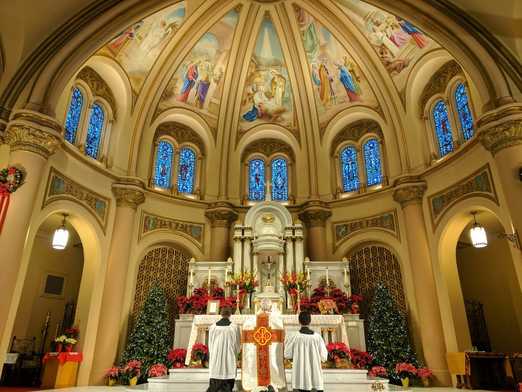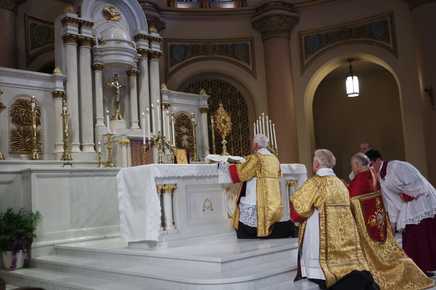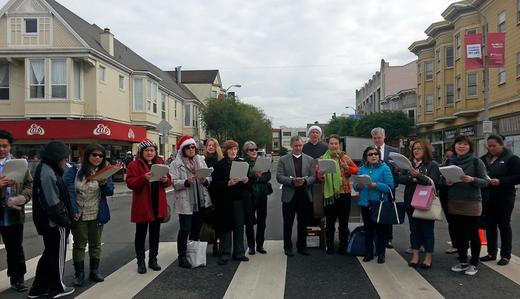 St. John's Day Mass at Star of the Sea.
St. John's Day Mass at Star of the Sea. The three feasts of the Christmas Octave extend this glory, each in a different manner. St. Stephen yesterday, St. John today, and the Holy Innocents tomorrow are all martyrs in the original sense; that is, they are witnesses. St. Stephen chose to die for the Name; St. John witnessed to his Master, Lord, and Beloved by writing his Gospel and Apocalypse from exile, and the Holy Children of Bethlehem endured their passion 33 years before Christ’s in mute testimony to the Truth. “Christ was born for this” as the song goes, born to die with these witnesses so they could save their own souls and give hope to others.
Each feast offers manifold treasures to the discerning heart, but I noticed something in St. Stephen’s collect that bears publishing. In the opening prayer of St. Stephen’s Mass we hear these words, which are not entirely translated into English: Da nobis, quesumus Domine, imitare quod colimus: ut discamus et inimicos diligere; quia ejus natalitia celebramus, qui novit etiam pro persecutoribus exorare Dominum nostrum Jesum Christum….
“Grant to us, O Lord we beg, to imitate that which we reverence….” Here we knelt, all facing the shining Christmas altar, reverencing with quiet joy the birth of our Savior. But we reverenced something else as well—His first martyr, Stephen. This man died in witness to the birth we celebrate. The prayer continues: “…that we may learn to love our enemies.” Stephen died forgiving his enemies, just like his Master and Lord. And by the way, for some reason that crucial line is left out of the reading in the new Mass. The older text concludes with Stephen “falling asleep in the Lord,” meaning he dies from stoning, but with these words on his lips: “Lord, do not hold this sin against them.” I can’t imagine why the new Mass reading ends before this line, because it holds the key to understanding Stephen’s martyrdom. He died not only in witness to Jesus but in witness to love for one’s enemies, as did his Master (“Father, forgive them for they know not what they do”).
The prayer continues. “because we celebrate his birth (“natalitia”), who learned to love those who persecuted him in praying for them to our Lord Jesus Christ.” When I looked over that prayer quickly before Mass, I thought the “natalitia” referred to Jesus—obviously we are celebrating Jesus’ birth. And it does refer to Jesus’ birth, indirectly, but directly it refers to Stephen’s birth, his birth into heaven. We celebrate Jesus’ birth this week, and in so doing celebrate the birth into eternal joy of all His witnesses. “Grant us, O Lord, to imitate what we celebrate” in St. Stephen’s Day, which is that we can learn to love those who hate us by praying to Jesus for them. Stephen did it, and we can do it.
There are a certain number of people who would consider themselves enemies to me, and I’ve wondered how to love them properly. No matter how hard we try to live in peace with all men, some people will inevitably not like us, and some even despise us. What do you say, how do you work with people who seem to hate you? Here surely is the answer: to pray to Jesus that I learn to forgive any and all wrongs, and to love those who persecute me. This is St. Stephen’s wisdom for all of us in this Season of Giving. We can love those who hate us, by the grace of the newborn Child, and this is the supreme Christian witness.







 RSS Feed
RSS Feed